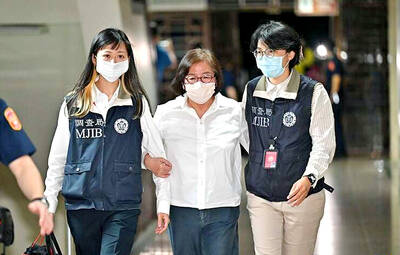An exhibition of preserved Chi-nese corpses opened in Kaohsiung yesterday, becoming the second human body show to open in Taiwan since German doctor Gunther von Hagens opened his body show in Taipei in April.
Cheng Chin-ting (
"This is a very interesting exhibition because it is an education on anatomy. It is worth visiting again and again," Cheng said at the opening ceremony.
The show is organized by Taiwan's Ginko Medical and Science Corporation, which helped Chinese hospitals and medical colleges preserve the bodies using plastination technology -- deep-freezing the bodies, sawing them into thin slices, dehydrating them, saturating them with polymer and curing them with gas, light or heat.
The company laid to rest suspicion in the media that the bodies were those of executed Chinese political prisoners, arguing that they are unclaimed bodies found at Chinese hospitals.
"We obtained export permission from China's Health Ministry and the Chinese Society of Anatomy. This is part of a medical exchange between Taiwan and China," Chen said.
"The purpose of the show is to make people realize how precious life is and make them treasure life," he said.
Chen said that at the moment, he has no plan to take the exhibition to foreign countries after it closes in Taiwan.
"But we would like to give some of the organ specimens and bodies to Taiwanese medical schools after the exhibition," he said.
The body show in Kaohsiung is the third corpse show in the world after the original show launched by von Hagens and a Chinese corpse show run by Sui Hongjin, former manager for von Hagens. Sui launched his own show after leaving von Hagens in 2000.
Von Hagens has several sets of human organ specimens and bodies -- donated by people from all over the world -- so that he can hold several shows at the same time.
Right now he has one show in Taipei and another in Frankfurt. Hagen's show in Taipei -- called Body Worlds -- opened on April 21 and will run until Oct. 24. Sui Hongjin held his human corpse exhibition in Beijing in April.

Costa Rica sent a group of intelligence officials to Taiwan for a short-term training program, the first time the Central American country has done so since the countries ended official diplomatic relations in 2007, a Costa Rican media outlet reported last week. Five officials from the Costa Rican Directorate of Intelligence and Security last month spent 23 days in Taipei undergoing a series of training sessions focused on national security, La Nacion reported on Friday, quoting unnamed sources. The Costa Rican government has not confirmed the report. The Chinese embassy in Costa Rica protested the news, saying in a statement issued the same

Taiwan is to extend its visa-waiver program for Philippine passport holders for another year, starting on Aug. 1, Minister of Foreign Affairs Lin Chia-lung (林佳龍) said on Friday. Lin made the announcement during a reception in Taipei marking the 127th anniversary of Philippine independence and the 50th anniversary of the establishment of the Manila Economic and Cultural Office (MECO) in Taiwan, the Ministry of Foreign Affairs said. The decision reflected Taiwan’s commitment to deepening exchanges with the Philippines, the statement cited Lin as saying, adding that it was a key partner under the New Southbound Policy launched in 2016. Lin also expressed hope

Temperatures in New Taipei City’s Sindian District (新店) climbed past 37°C yesterday, as the Central Weather Administration (CWA) issued heat alerts for 16 municipalities, warning the public of intense heat expected across Taiwan. The hottest location in Taiwan was in Sindian, where the mercury reached 37.5°C at about 2pm, according to CWA data. Taipei’s Shilin District (士林) recorded a temperature of 37.4°C at noon, Taitung County’s Jinfeng Township (金峰) at 12:50 pm logged a temperature of 37.4°C and Miaoli County’s Toufen Township (頭份) reached 36.7°C at 11:40am, the CWA said. The weather agency yesterday issued a yellow level information notice for Taipei, New

CASE: Prosecutors have requested heavy sentences, citing a lack of remorse and the defendants’ role in ‘undermining the country’s democratic foundations’ Five people affiliated with the Chinese Nationalist Party (KMT), including senior staff from the party’s Taipei branch, were indicted yesterday for allegedly forging thousands of signatures to recall two Democratic Progressive Party (DPP) lawmakers. Those indicted include KMT Taipei chapter director Huang Lu Chin-ru (黃呂錦茹), secretary-general Chu Wen-ching (初文卿) and secretary Yao Fu-wen (姚富文), the Taipei District Prosecutors’ Office said in a news release. Prosecutors said the three were responsible for fabricating 5,211 signature forms — 2,537 related to the recall of DPP Legislator Wu Pei-yi (吳沛憶) and 2,674 for DPP Legislator Rosalia Wu (吳思瑤) — with forged entries accounting for